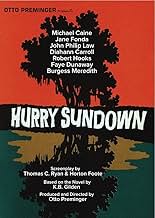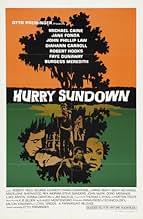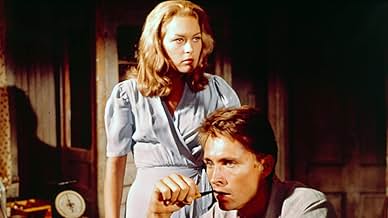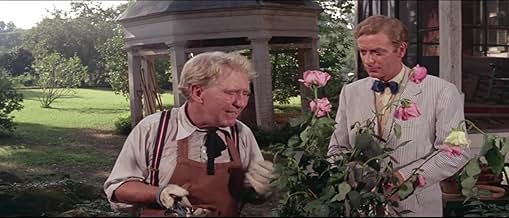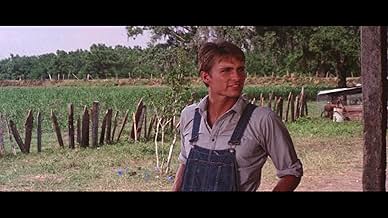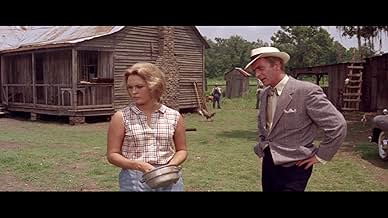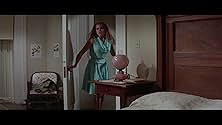NOTE IMDb
5,9/10
1,5 k
MA NOTE
Ajouter une intrigue dans votre langueDrama of a ruthless Southern opportunist who tries to buy his cousin's land, and when thwarted, brings several tragedies to the lives of his loved ones.Drama of a ruthless Southern opportunist who tries to buy his cousin's land, and when thwarted, brings several tragedies to the lives of his loved ones.Drama of a ruthless Southern opportunist who tries to buy his cousin's land, and when thwarted, brings several tragedies to the lives of his loved ones.
- Réalisation
- Scénario
- Casting principal
- Victoire aux 1 BAFTA Award
- 1 victoire et 2 nominations au total
Avis à la une
I'm really not understanding why folks are so down on this film. Hurry Sundown
is far from the masterpiece of Otto Preminger's career. But he did assemble a
good cast who as an ensemble do quite well in their roles.
Michael Caine and John Philip Law are cousins. Caine used to work on a shrimp boat but married into southern gentry when he wed Jane Fonda. He's now trying to be a big shot businessman putting together parcels of land. Only two won't sell out Law and black neighbor Robert Hooks.
Law has just returned from World War 2 to wife Faye Dunaway and their kids. The war has taken him away from the south and given him an itch to wonder. He might sell, but Caine relies too much on the blood connection and approaches him all wrong.
Law does the unheard of thing in the post World War 2 south, he partners with Hooks and they dig some needed irrigation ditches using explosives.
That sets off all that follows because law and with some trepidation goes into a partnership with a black man. Something that just wasn't done in Georgia of 1946.
Both Fonda and Dunaway are ravishing and both are coming into their own as name players. Caine follows in the tradition of British actors playing southerners that seems to have started with Leslie Howard and Gone With The Wind. Law is the key character in this drama, it's his decisions are what turn the plot and he runs a good range of emotions doing it.
Hurry Sundown is not a bad picture of the south just before the civil rights revolution. Believe me pay no attentions to the bad reviews.
Michael Caine and John Philip Law are cousins. Caine used to work on a shrimp boat but married into southern gentry when he wed Jane Fonda. He's now trying to be a big shot businessman putting together parcels of land. Only two won't sell out Law and black neighbor Robert Hooks.
Law has just returned from World War 2 to wife Faye Dunaway and their kids. The war has taken him away from the south and given him an itch to wonder. He might sell, but Caine relies too much on the blood connection and approaches him all wrong.
Law does the unheard of thing in the post World War 2 south, he partners with Hooks and they dig some needed irrigation ditches using explosives.
That sets off all that follows because law and with some trepidation goes into a partnership with a black man. Something that just wasn't done in Georgia of 1946.
Both Fonda and Dunaway are ravishing and both are coming into their own as name players. Caine follows in the tradition of British actors playing southerners that seems to have started with Leslie Howard and Gone With The Wind. Law is the key character in this drama, it's his decisions are what turn the plot and he runs a good range of emotions doing it.
Hurry Sundown is not a bad picture of the south just before the civil rights revolution. Believe me pay no attentions to the bad reviews.
Lousy Otto Preminger film from K. B. Gilden's bestseller (adapted by Thomas C. Ryan and, of all people, Horton Foote!) concerns a greedy white land-owner in Georgia planning to dupe his wife's black guardian and her sharecropper husband out of their real estate, setting off a race war. Everyone is here, from Faye Dunaway to Brady dad Robert Reed, but the script is such a mess--and Preminger is so ham-handed--that nobody survives "Sundown" without looking foolish. Jane Fonda flirts with husband Michael Caine using his saxophone (!) while Beah Richards pantomimes a heart attack as if this were a stage-play. Preminger goes out of his way to make the rich whites despicable and the black folk saintly and reasonable--so much so that the picture might have started its own race war in 1967 (probably the exact type of controversy the director wanted). It certainly gave work to many underemployed, sensational actors like Madeleine Sherwood, Diahann Carroll, Rex Ingram and Jim Backus, but results are laughable. *1/2 from ****
It's difficult to concisely describe the plot of Hurry Sundown; it's a film about the racial divide, family squabbles, class distinction, and corporate takeover of land. Among the subplots are marital difficulties, Southern life, parenthood, a developmentally challenged child, questionable honor of the legal system, and coming-of-age dilemmas.
Michael Caine is married to Jane Fonda, and while they're a well-to-do Southern couple on the outside, beneath the surface lies infidelity and parenting issues. Michael's poor cousin, John Phillip Law, is married to Faye Dunaway, and he also has trouble with his children. Robert Hooks and his mother Beah Richards live on land that used to belong to Jane's family, back when they owned slaves. As a gift, they gave the land to Beah, but when Michael Caine's company wants to build on it, racial tensions lead to unforeseen consequences that affect all three families.
Even though I have a soft spot in my heart for Michael Caine and refuse to ever really see him as a bad guy, he's known for his meaner roles. In Hurry Sundown, he's just about as mean as it gets. He gives a fantastically chilling performance, and his Southern accent is nearly flawless. Faye Dunaway also stands out in her smaller role, since it's unlike the cold, calculating, classy roles she usually takes. Be on the lookout for Diahann Carroll, Burgess Meredith, and George Kennedy as the adorable but incompetent sheriff.
This is a very well-acted film that fits in with other hot-blooded films of its time, like In the Heat of the Night and The Long, Hot Summer. It's one of the steamiest films made in the 1960s, and it sheds light on a number of important issues. Director Otto Preminger, king of films that push the envelope, creates another masterpiece that makes you feel like you need a good scrubbing after watching it.
Kiddy Warning: Obviously, you have control over your own children. However, due to racial language, sexual situations, and violence involving children, I wouldn't let my kids watch it.
Michael Caine is married to Jane Fonda, and while they're a well-to-do Southern couple on the outside, beneath the surface lies infidelity and parenting issues. Michael's poor cousin, John Phillip Law, is married to Faye Dunaway, and he also has trouble with his children. Robert Hooks and his mother Beah Richards live on land that used to belong to Jane's family, back when they owned slaves. As a gift, they gave the land to Beah, but when Michael Caine's company wants to build on it, racial tensions lead to unforeseen consequences that affect all three families.
Even though I have a soft spot in my heart for Michael Caine and refuse to ever really see him as a bad guy, he's known for his meaner roles. In Hurry Sundown, he's just about as mean as it gets. He gives a fantastically chilling performance, and his Southern accent is nearly flawless. Faye Dunaway also stands out in her smaller role, since it's unlike the cold, calculating, classy roles she usually takes. Be on the lookout for Diahann Carroll, Burgess Meredith, and George Kennedy as the adorable but incompetent sheriff.
This is a very well-acted film that fits in with other hot-blooded films of its time, like In the Heat of the Night and The Long, Hot Summer. It's one of the steamiest films made in the 1960s, and it sheds light on a number of important issues. Director Otto Preminger, king of films that push the envelope, creates another masterpiece that makes you feel like you need a good scrubbing after watching it.
Kiddy Warning: Obviously, you have control over your own children. However, due to racial language, sexual situations, and violence involving children, I wouldn't let my kids watch it.
I get the impression that most of the comments here are more influenced by the entry in "The 50 Worst Films of All Time" than by the film "Hurry Sundown" itself. Personally I don't give much credit to that book since I consider Michael Medved to be one of the four or five worst film reviewers of all time.
"Hurry Sundown" has been pretty much out of circulation in recent years. I shudder to think how network censors would have butchered it when it was broadcast on TV; anyone who saw it that way saw a different movie. It is now finally available on a good widescreen DVD and also on Amazon and Netflix streaming. I had been wanting to see it for a long time, if for no other reason than it being one of the handful of mainstream Hollywood films to earn a "condemned" rating from the Catholic Legion of Decency.
It wasn't nearly as bad as I expected; in fact I thought it was pretty good. It held my unflagging interest for its almost two-and-a-half hour running time, which is an accomplishment in itself; the worst thing a movie can be is boring. Not a great film, but an entertaining piece of Southern Gothic.
I couldn't get that upset at the casting of Michael Caine. I've certainly heard worse southern accents in movies. How about "Gone with the Wind" in which two of the four leads were played by Brits (and neither Leslie Howard nor Clark Gable even tried to sound southern)? Caine looked and sounded tentative in the opening helicopter scene (maybe that was the first scene filmed) but got more comfortable with the part as it went along. In many ways, Caine fit the role perfectly, since his character was a self-absorbed philanderer just like "Alfie."
People have scoffed at Burgess Meredith's racist judge, but let's face it, folks – people like that really existed in the South back then (and maybe still do; is that Arizona sheriff much different?). Was Meredith's portrayal much more over-the-top than Ed Begley's in "Sweet Bird of Youth", which won an Oscar? I got the impression that Meredith might have been basing his character on George Wallace (the pre-1968 version), and he wouldn't have been far off.
As for the poor having better sex than the rich, well that's one of those clichés that just might have a bit of truth in it, especially when the poor girl is Faye Dunaway.
Were the black characters over-idealized? Perhaps, but that is the way Hollywood handled race issues back in the civil rights era. See, for example, pretty much anything starring Sidney Poitier. I don't remember anyone trying to make a film of William Faulkner's "Light in August," in which the central character is a mixed-race psychopath.
"Hurry Sundown" is a good choice when you want a nice juicy wallow in southern decadence. The color photography is pretty good, as is the musical score by Hugo Montenegro.
"Hurry Sundown" has been pretty much out of circulation in recent years. I shudder to think how network censors would have butchered it when it was broadcast on TV; anyone who saw it that way saw a different movie. It is now finally available on a good widescreen DVD and also on Amazon and Netflix streaming. I had been wanting to see it for a long time, if for no other reason than it being one of the handful of mainstream Hollywood films to earn a "condemned" rating from the Catholic Legion of Decency.
It wasn't nearly as bad as I expected; in fact I thought it was pretty good. It held my unflagging interest for its almost two-and-a-half hour running time, which is an accomplishment in itself; the worst thing a movie can be is boring. Not a great film, but an entertaining piece of Southern Gothic.
I couldn't get that upset at the casting of Michael Caine. I've certainly heard worse southern accents in movies. How about "Gone with the Wind" in which two of the four leads were played by Brits (and neither Leslie Howard nor Clark Gable even tried to sound southern)? Caine looked and sounded tentative in the opening helicopter scene (maybe that was the first scene filmed) but got more comfortable with the part as it went along. In many ways, Caine fit the role perfectly, since his character was a self-absorbed philanderer just like "Alfie."
People have scoffed at Burgess Meredith's racist judge, but let's face it, folks – people like that really existed in the South back then (and maybe still do; is that Arizona sheriff much different?). Was Meredith's portrayal much more over-the-top than Ed Begley's in "Sweet Bird of Youth", which won an Oscar? I got the impression that Meredith might have been basing his character on George Wallace (the pre-1968 version), and he wouldn't have been far off.
As for the poor having better sex than the rich, well that's one of those clichés that just might have a bit of truth in it, especially when the poor girl is Faye Dunaway.
Were the black characters over-idealized? Perhaps, but that is the way Hollywood handled race issues back in the civil rights era. See, for example, pretty much anything starring Sidney Poitier. I don't remember anyone trying to make a film of William Faulkner's "Light in August," in which the central character is a mixed-race psychopath.
"Hurry Sundown" is a good choice when you want a nice juicy wallow in southern decadence. The color photography is pretty good, as is the musical score by Hugo Montenegro.
This mint julep melodrama is a hooty delight. I suppose that at the time it was meant to shine a light on racial injustice in the south but it just comes off as an over-baked soap opera. Preminger was the wrong director for such a piece of honeyed excess, this is the type of thing at which Douglas Sirk excelled and could make trenchant observations while still entertaining the masses. Still worth watching for the cast alone. Jane Fonda gives the most enjoyable performance even if her honeychile accent comes and goes. And even as a sharecropper's wife with four kids Faye Dunaway manages to look ravishing. If you like overdone melodramas with lots of stars and little sense than this is for you, if not stay away!
Le saviez-vous
- AnecdotesMichael Caine's first attempt at an "American" accent. Vivien Leigh told him to memorize the phrase "four-door Ford".
- GaffesIn one scene, as the camera pans down the street, a later model Ford is in a carport.
- Citations
Julie Ann Warren: It wasn't until I was ten years old that I realized that "damn" and "Yankee" were two separate words!
- Crédits fousThe Paramount logo does not appear on this film.
- ConnexionsEdited into Austin Powers dans Goldmember (2002)
Meilleurs choix
Connectez-vous pour évaluer et suivre la liste de favoris afin de recevoir des recommandations personnalisées
- How long is Hurry Sundown?Alimenté par Alexa
Détails
- Date de sortie
- Pays d’origine
- Langue
- Aussi connu sous le nom de
- Hurry Sundown
- Lieux de tournage
- 7307 Goodwood Avenue, Baton Rouge, Louisiane, États-Unis(Henry & Julie Warren's mansion)
- Société de production
- Voir plus de crédits d'entreprise sur IMDbPro
Box-office
- Budget
- 4 000 000 $US (estimé)
Contribuer à cette page
Suggérer une modification ou ajouter du contenu manquant

